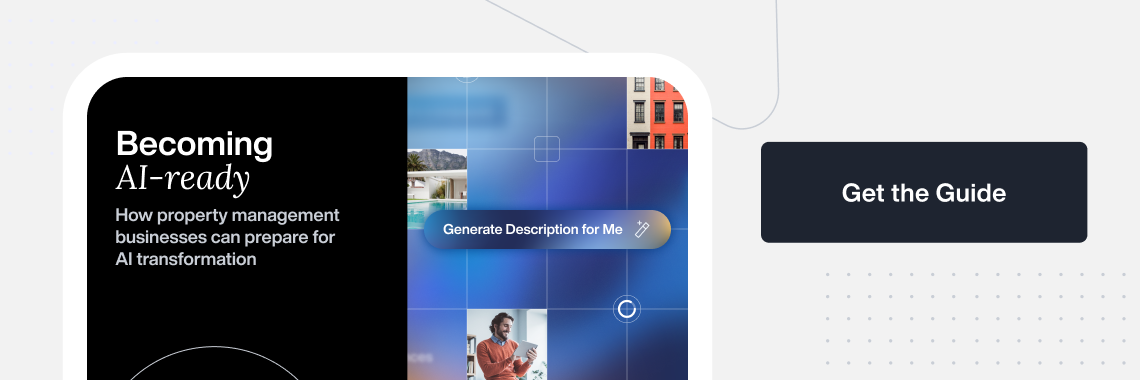Published on September 5th, 2023
By Brittany Benz
You’ve no doubt seen the uptick in buzzworthy news headlines and articles published lately about artificial intelligence (AI). Thanks to newly developed, publicly available solutions, next-gen AI technology is on everyone’s mind right now, and for good reason.
The AppFolio 2023 Property Manager Hiring and Retention Report, conducted in early 2023, revealed that even during the earliest stages of AI adoption, team members at every level in property management could already see the benefits.
In fact, regardless of role or function, at least a quarter or more of survey respondents agreed with the statement, “Artificial intelligence and natural language models (e.g., ChatGPT) can benefit my company.” However, there’s still a disconnect between those who believe AI will be beneficial and those who have actually started to utilize and adopt it: AppFolio also saw that 63% of property managers are staying on the sidelines for now.
Even if you haven’t started diving into using next-gen AI tools yet, you’ve likely at least started considering how they might fit into the future of your property management business.
However, before jumping right into adopting general AI solutions and putting generic tools in place, there are a few points to consider, including:
- Different types of AI solutions available
- Why property management businesses should explore AI
- How AI can benefit your property management business
Read through this primer on what you need to know right now about AI solutions, especially as they relate to your property management business.
What is generative AI, and why is it different?
Today, “AI” is used as a catch-all term for all things artificial-intelligence-based. However, there are actually many different types of AI in use today, including some that have been part of our daily lives for years.
The two main types you’ll encounter are narrow AI and generative AI:
What is narrow AI?
This is the most common type of AI and is embedded into almost every smart device today, including phones, smart home assistants, and smart speakers.
Narrow AI is designed for a specific set of capabilities and focuses on a very specific task. This includes virtual assistants like Siri and Alexa and the technology behind autonomous vehicles, aka self-driving car technology.
For example, many e-commerce website platforms leverage narrow AI to recommend products you may like based on your search history or product purchases.
“These are systems that are designed or trained to carry out a very specific task or solve a particular problem. I think the best examples of narrow AI are voice assistants like Siri or Alexa. These have been around for a while. So, that’s called narrow AI.”
— Cat Allday, Vice President, AI and Product Operations, AppFolio
Sometimes called “weak AI,” narrow AI is intended for a specific function and doesn’t possess the broad understanding or versatility of human intelligence. This is arguably the most important distinction when comparing it to generative AI.
What is generative AI?
This is the type of AI that everyone is talking about right now. If you have heard of or used ChatGPT, then you already know more than you think you do.
It’s called “generative AI” because it can generate responses capable of solving complex issues with specificity and customization based on user-entered prompts. In other words, the technology draws from large sets of input data to “think on” and then produces a much more complex answer than any narrow AI is capable of.
Additionally, most generative AI platforms are also large-language learning models, which means they can actually update and refine their problem-solving capabilities based on new information or inputs provided.
These solutions are usually presented in a conversational AI interface, which makes it easier for humans to interact and chat with them. It’s also what makes responses feel more “human-like” and easy to understand. The appeal of generative AI is understandable considering language models like GPT-3 can produce human-like text. These results are already revolutionizing content creation and chatbots and are even aiding in language translation.
“This is what you’re hearing about in the media today where these technologies leverage deep learning, and they’re able to produce text, video, and images based on user-given prompts. The examples are things like ChatGPT. I don’t know if you guys have ever played with DALL·E, which is the image creator that is also an OpenAI product. Then Bard, which is Google’s large-language model.”
— Cat Allday, Vice President, AI and Product Operations, AppFolio
Another example of generative AI? The global application of AI in AppFolio Realm, the AI-powered set of capabilities in AppFolio Property Manager. With a universal interface, it was built specifically for property management businesses to help them overcome their unique challenges. Realm features include the AppFolio AI Leasing Assistant, Lisa, Smart Bill Entry, Bank Feed, Smart Maintenance, FolioGuard™ Smart Ensure, and many more capabilities designed to increase team productivity by automating repetitive tasks while also helping teams get familiar and comfortable with AI.
Bottom line: Generative AI and narrow AI are two different types of artificial intelligence with interconnected aspects. Generative AI focuses on creative content generation and pattern extrapolation with a revolutionary conversational, almost human-like element, while narrow AI excels in precisely performing specific but limited tasks. Both have already had — and will continue to have — a profound impact on various industries, including property management.
Property management companies should explore and adopt generative AI
Generative AI has massive potential to change the way property management companies work, especially from an efficiency perspective. In addition to being a potential major competitive differentiator, it could also help drive businesses forward during uncertain times, like with today’s fluctuating housing markets, record-high inflation rates, and ongoing staffing and training challenges.
Generative AI may very well lead to new levels of efficiency, creativity, and innovation, as well as the streamlining of operations (think predictive maintenance), resident experiences, and more.
AI helps teams do more with less
In a tough labor market and with ongoing hiring and retention challenges, AI can help alleviate burnout among teams by taking tasks and to-dos off their plates. In short, when implemented properly, generative AI supports team members by making their day-to-day tasks easier to accomplish without replacing employees.
Research from Standford and MIT University has demonstrated how generative AI is boosting productivity for customer service agents of a Fortune 500 company. Specifically, AI led to a 14% increase in productivity among workers. One of the researchers’ key findings was that AI “took people with just two months of experience and had them performing at the level of people with six months of experience, […] so it got them up the learning curve a lot faster.”
AI removes the burden of “busywork”
Generative AI can take manual, repetitive work off team members’ plates. That, in turn, can help improve job satisfaction, retention, and performance.
Instead of doing double- or triple-data entry, team members can focus more on work that they enjoy and that truly needs human brain power behind it.
This also means team members can get to higher priority, business-critical tasks sooner than they usually would.
According to our 2023 AppFolio Hiring and Retention Report, “Staff report 36% of their time is spent on ‘busywork,’ which is down from 40% in 2022. They also believe 15 hours per week — or 38% of a 40-hour work week — could be optimized or streamlined through technology, up from 14 hours in 2022.”
AI can improve residents’ experiences
A significant benefit is that AI can be “on call”’ 24/7/365 for your organization when implemented properly with the right solutions in place.
Oftentimes, generative AI-powered chatbots can handle routine renter inquiries with learned, timely responses, although ample input and responsible moderation will still be necessary.
For example, the AppFolio AI Leasing Assistant, Lisa launched in 2019. This tool combines a collection of AI-driven concepts and models, including natural language understanding and policy and the ability to process external knowledge to determine the next best steps in conversations.
This improves tenant satisfaction and frees property management staff to focus on more complex tasks, which can lead to faster resident response times and overall improved perceptions of service no matter the time of day or night.
And this also frees up property management teams to focus on more complex tasks. However, you still need to “feed” your AI tool with human, conversational responses to see this improved resident experience benefit.
When asked if it mattered that people knew AI was being used for responses, Top Floor podcast guest and best-selling author Jay Baer recently said:
“I think it depends on where you’re at in the journey. I think the human touch, or the perception of a human touch, is important because it sets up a ‘We care about you’ relationship from the beginning. If you’re already a resident and you’re like, ‘Hey, somebody’s got to fix the hinges on this door into the bathroom, it’s super squeaky. It’s driving me crazy,’ I don’t think that the human touch is nearly as important at that point. So, it [depends on if] you have an existing relationship and what is the ask [that] dictates how you want that feeling to be created.”
How AI can provide better business insights
Implementing property-management-specific AI into your workflows and systems can help you discover patterns in your business data, gain actionable insights, and drive your business toward success.
For example, over time you may be able to have generative AI analyze historical data and property maintenance records to then proactively predict when maintenance issues are likely to occur before a resident complains or submits a request.
Successfully implementing generative AI
Before your property management business embraces AI, it’s important to realize that success depends on much more than just technology.
AI solutions are already being adopted by organizations across every industry at an incredible pace. Even so, before you can reap the benefits of generative AI, you need to lay the groundwork in your business to enable this technology to help you accomplish your goals. Implementing AI without prep work or a strategy that fits your business goals won’t help you increase efficiency.
Instead of diving right in, first look at your organization’s level of AI preparedness. This will help ensure any AI solutions adopted will work for your specific needs and workflows. Consider these generative AI readiness assessment areas to start.
Centralized systems: AI works best when it’s connected to every part of your business. The more data it can take in, the better the results and outcomes. To do so, you need to have an AI solution that can connect to every part of your system and/or that integrates with a centralized system. Specifically, you’ll want to make sure that AI can be integrated into your project management system. If you choose disparate systems, your data will be disjointed, and you’ll likely experience the same challenges that you had before.
To truly reap the benefits AI has to offer property management companies, ensure your systems are centralized and that you’re using a single property management platform with AI built in so everything is connected from a data and workflow perspective.
AI policies and guidelines: Because there is so much gray area around AI, you must establish policies and guidelines for how AI will be used within your organization. Consider the way its use could affect your employees, property owners, and residents. Policies and guidelines should emphasize using AI responsibly and transparently, and they should include do’s and don’ts for when to use — or when not to use — AI for everyday tasks.
This will not only provide your team members, residents, and owners with your view on what the future of AI looks like for your business and how it will affect them, but it will also build trust and credibility.
“Responsible AI is the development and deployment of AI in a way that aligns with ethical principles and values. It ensures the technology is designed, implemented, and used in a way that respects the rights of people and promotes fairness, transparency, and accountability. If you’re working with a vendor or partner, you should be able to ask them, ‘What is your stance on responsible AI? What are your policies and practices?’ Companies should be able to share that.”
— Cat Allday, Vice President, AI and Product Operations, AppFolio
Team training and organizational change management: It’s clear that AI can revolutionize the way we work, yet not everyone will understand how to use it right away. Because AI is so different from how businesses typically operate today, allocate ample time for thorough training before rolling out any new solutions. In this circumstance, it’s better to delay a rollout than to launch without having all staff training and competencies in place.
Resident and owner communications: Provide clear communication to help residents and owners understand how and why your organization is implementing AI. For instance, AI could mean quicker maintenance request handling for residents and faster, more detailed reporting for owners. Additionally, transparently sharing your AI policies and frameworks builds reassurance that your company is committed to protecting information and privacy.
It’s worth noting that almost 50% of the employees that participated in the AppFolio Hiring and Retention Report survey said they see technology as a key solution in responding to resident questions and requests. In addition, the AppFolio 2022 U.S. Resident Motivations Report found nearly one-third of U.S. renters said using digital tools to help manage their rental has become more important to them.
Illustrate these tools as something everyone — residents, owners, and team members — can take advantage of to get needs met instead of potentially viewing AI as a barrier.
Get started with AI
There’s a lot of consideration, time, and effort that goes into adopting and integrating AI into the day-to-day operations of your property management business. The payoffs, however, can be well worth it. For more insights on how your business can benefit from AI, download our free guide below.











Comments by Brittany Benz